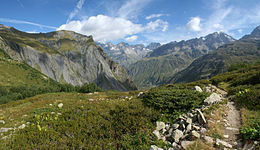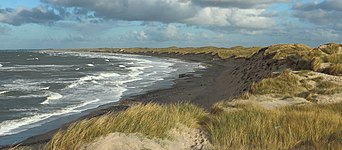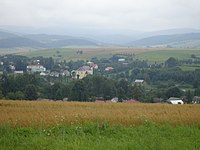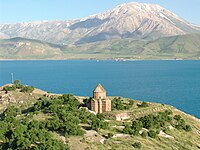Rhynovia
Grand Principality of Rhynovia Великое княжество Рхыновиа (Slavic) | |
|---|---|
Motto: To Rule is To Serve | |
| Location of Rhynovia (dark green) – in Belisaria (dark grey) Location of Rhynovia (dark green) – in Belisaria (dark grey) | |
| Political Map of Rhynovia Political Map of Rhynovia | |
| Capital and | Rhynovia |
| Official language | Slavic |
| Ethnic groups (2016) |
|
| Religion | Rhynovian Orthodox |
| Demonym(s) | Rhynovian |
| Government | Monarchy |
• Grand Princess | Karina Aristov |
• Chancellor | Grand Duke Emil Medved |
| Legislature | Assembly of Ranks |
| Formation | |
• Founding of Grand Principality | 1078 A.D. |
• Worker's Republic | 2 February 1962 |
• Republic | 17 June 2005 |
• Second Grand Principality | 13 March 2011 |
| Area | |
• | 437,271 km2 (168,831 sq mi) (nth) |
| Population | |
• 2016 estimate | 42,341,014 |
• 2013 census | 41,011,278 |
• Density | 96.83/km2 (250.8/sq mi) |
| GDP (PPP) | 2016 estimate |
• Total | $1.439 trillion |
• Per capita | $34,024 |
| HDI | 0.76 high |
| Currency | Rhybal (₽) |
| Date format | dd/mm/yyyy (AD) |
| Driving side | right |
| Calling code | +81 |
| Internet TLD | .rhy |
The Grand Principality of Rhynovia or what is commonly known as Rhynovia is a Semi-Constitutional Slavic Monarchy located on the northern shores of Periclean Sea in the region of Ajax, bordered on the west by Rabinovska and the north by Nekulturnya. It is centered at the crossroads of both Belisarian and Ocran trade and is often the known as the eastern gateway to Belisaria. Rhynovia is a direct descendant and successor to the Empire of Velikoslavia.
Rhynovia is a developed country with a HDI index of 0.76. Its major industries include Metallurgy, Industrial Production, Agriculture, and Consumer goods. With its locations on the northern shore of the Periclean sea and the border of both Belisaria and Ocran, Rhynovia enjoys trade with both western and eastern powers with easy access to both. It's geographical location is also of great strategic importance, opposite the major shipping choke point, the strait of Ahkad. Free passage of trade ships and goods through this straight is of major interest to Rhynovia in current affairs.
Having recently reformed from a communist Worker's Republic, to a democratically run Republic, and finally back to a Monarchy (as it was historically) the issues within Rhynovia are often focused on economic improvements and catching up with other major western powers in quality of life of its citizens. Formerly the Worker's Republic bloated budget and lack of clear international policy and focus, the overall economic outlook of the nation suffered. A major economic renaissance occurred at the fall of the communist regime and the opening of its borders and industries to other democratically inclined western powers. This surge in demands for exports has brought Rhynovia to Xth in the region for economic growth in the past decade and the Xth exporter in Belisaria.
A Semi-Constitutional Monarchy, Rhynovia is lead by a Prince(cess) titled more formerly as "Grand Prince(cess)" of the Aristov Dynasty. This monarch is head of state and government and has absolute power over the day to day interests of the Grand Principality, with few exceptions in relations to the Charter of the Peoples which is a constitution of Rhynovia that outlines basic rights of its people the Monarch is charged with upholding and protecting. This absolute form of government is tolerated largely due to the cultural propensity of the Rhynovian people towards a stratified society where every has a place, or "rank". The Assembly of Ranks is the closest thing to a legislative body in Rhynovia that consists of all the nobles of rank and title within the Grand Principality, with the responsibility of advising and bringing issues to the monarch.
Etymology
The origination of the name Rhynovia came from the 10th century Velikoslavian term for the area along the Fawngorod coast known as Rhyland. This was given by Slavs migrating southward to find trade routes over the Periclean Sea. Many who settled there gave it the term Rhyland which is believed to be translated as "beautiful coast" as it was described by some of the first settlers to the area.
History
The Grand Principality of Rhynovia first appeared around the 11th Century as a small portion of Velikoslavia in south eastern Belisaria. The nation itself prospered as a half way point for merchant goods coming from Ocran and flowing through the Periclean sea to the rest of Belisaria. For hundreds of years this merchant principality existed until the turn of the 18th century as it was ravaged by internal strife of Velikoslavia thus triggering the exit of Rhynovia and its ascension to sovereignty. By the 20th century Rhynovia was suffering from extreme poverty in its lower class caused by several conflicts and the lack of trade coming from Ocran. This became a breeding ground for communist activists to start a ground swell of popular worker support to overthrow the Rhynovian monarchy, the Aristov family. While the Aristovs were known for their compassion and care for their subjects, the powers behind the Red Revolution of 1954 did not discriminate between good and bad aristocracy, forcing the royal family of Prince Anatoly Aristov the III to flee their country and live in exile in the Federation of Belfras.
For several decades Rhynovia existed as the Workers Republic of Rhynovia, enjoying no improvement of economic conditions. Near the 1990s Rhynovian regulation on their economy began to lessen to allow for a freer market to interface with those in western Belisaria. Yet just as was exhibited in the early parts of the 20th century, discontent with conditions in the Worker's Republic began to grow.
It was around this time that the Rhynovian Worker's Party Secret Police in their decades long search for the Aristov Dynasty found the now aging Prince Anatoly Aristov the III as well as his family which now included a son Prince Grigori the IV and three grandchildren Prince Arkady the I, and princess Nikita and Karina. As reported later by a servant to the Royal family who escaped, the Secret Police bound each of the Aristov family members to chairs in their Thessalona hotel room and executed them before setting their hotel room ablaze. The Worker' Party in their statement claimed the fire was an accident, but the statement of the aforementioned servant and an investigation by the authorities of the Federation of Belfras proved that they were in fact murdered, a huge scandal amongst many Rhynovia circles. Rumor persisted though that the youngest Aristov granddaughter somehow survived the extrajudicial killing, and is still in hiding somewhere in the world.
The news of the brutal murder of the former monarchs was just a small straw in the many that fell on the back of the Worker's Republic of Rhynovia. Soon the communist government would concede that the country would be in utter economic collapse under their rule, despite some gains with the easing of regulations. In 2003 the Worker's Party abdicated the government of Rhynovia and special elections were held under the watchful eye of regional authorities from various nations with interest in the stability of Rhynovia. With the return of democracy, Rhynovia became "The Republic of" and for several years enjoyed economic growth with many foreign investments trickling into the country from throughout the region. However only a few short years did it take to unearth the extreme polarization of the country and through lack of proper authority that the people of Rhynovia enjoyed, the direction of the country was hotly debated and the nation risked being thrown back into political chaos.
Since the inception of Rhynovia as a nation and even to modern times, the culture of the Rhynovian people has been of a very traditional and religious background. The older generations of Rhynovians still remembered the peaceful and benevolent dynasty of the Aristov family. As a sort of cultural phenomenon the legend of the surviving Princess Karina Aristov coupled with growing discontent with the democratically elected government's inaction, a movement known as the Orange Revolution kicked off to enact a democratically initiated regime change and convert the Republic of Rhynovia back to the monarchy. The chaotic nature of tyranny by the majority was against many of the cultural values of the Rhynovian people. Thus after near 2 years of peaceful protests and democratic action, in 2014 the country was returned to the Grand Principality of Rhynovia.
At this time many of the descendants of the countries aristocrats such as various dukes from several regions within Rhynovia were invited back to reform the government. A temporary head of state was appointed in the form of Lord Governor Emil Medved, the Grand Duke of Gornaya. As he oversaw the formation of the new government and the drafting of a bill of rights for the people of Rhynovia, he also set out on the task to find their missing Princess...
Geography
Rhynovia sits to the far east of Belisaria near the shelf between it and Ocran. To its north sits the southern ridge line of the Nekullturnyan Mountains, the west is rolling hills and mountains that then descend into the River Rhy basin on the border with Rabinovska, the east is the Sinovia mountain range that makes the highest point in Rhynovia, and the south features the coastal areas of the Gulf of Tania and the Peninsula of Rhyland which sits on the Periclean Sea. Rhynovia is best know for its rich farmlands that sit near the center of the country and roll down to the coastline gradually. The majority of Rhynovia consists of these rolling hills best for farming and is adorned by mountains on the north and eastern sides which have historically separated the Rhynovian people and culture from northern and eastern Slavs.
The island of Anicheka sits just south of the Rhyland Peninsula is known for its sheer cliffs that fall into the Periclean Sea and its rocky formations that sit off of its coastline. The tides between the island and the mainland are known for its drastic rise and fall throughout the cycle of the year and often feature cave formations on the island side of the strait of Anicheka.
Climate
The coastal zones of Rhynovia feature warm climates and mild winters while the majority of the central part of the country is considered a humid continental climate and can have seasonally harsh winters in the late season. Mountain areas and those in higher elevations will see cool to severally cold temperatures year around. |
Politics
Rhynovia is a Semi-Constitutional Monarchy in which the absolute power over state and government is given to the monarch (or in his/her absence the Lord Governor all responsibilities) with the exception of a constitution known as the Charter of the Peoples that outlines laws that the monarch must abide by in relation to human rights and noble custom. This form of government was formed in 2011 when the referendum of Rhynovia was passed by the House of the Rhynovian Republic upon popular demand. A shift from a democratically elected government to a monarchy while rare is a product of a deep cultural custom to stratified society and traditional values.
Rights such as the freedom of non-treasonous speech, small amounts of religious liberties, inheritance rights, rights of various nobles to govern their lands, and repercussions for those of noble rank who don't abide by the Charter of the Peoples are few of the things that limit the monarch. While the list is short on what the monarch does not have power over, this charter is closely guarded by the Assembly of Ranks, a body of noblemen and noblewomen with title who are both the advisory to the monarch, guardians of the Charter of the Peoples, and the Representative body of the people and various subdivisions of Rhynovia. This assembly is the closest thing to a legislature in Rhynovia, though it can be more so equated to a Lord's Counsel. This body is convened either at its own will, when called so by the monarch, or during time of national emergency. While no defined power is given to this body, the Charter of the Peoples simply says the Assembly of Ranks "shall protect upon its noble blood the purity of Rhynovia and this Charter". While no such instance of use of this responsibility has been used, it is generally interpreted as the check and balance against a monarch who would not abide by the Charter.
The Monarch is is decided by absolute cognatic primogeniture in which the oldest child whether they be male or female inherits the thrones of Rhynovia upon the death, abdication, or incapability of the ruling monarch. If the child is younger than 13 years of age or a temporary absence in succession a Lord Governor can be appointed by the eldest member of the ruling dynasty or if unavailable the assembly of ranks. Laws for succession pertaining to all levels from simple Counts to the Grand Prince are contained in the Charter of the Peoples to ensure peaceful transition between predecessor and heir.
Powers such as command over the nation's military, appointments of government officials, purse, and representation of Rhynovia on an international scale are a few of the responsibilities that the Monarch does enjoy within the bounds of the Charter. This absolute mentality is meant to be efficient in the way of governance of Rhynovia as to meet the pressing needs of the nation without deliberation, distension, or delay. In this form the monarch of Rhynovia is meant to be the guardian of the people, sovereignty, and will of the nation. Diplomacy and declarations of war are two of the most powerful tools the monarch has in their defense of the nation, and are often used to display the monarch adeptness at their position.
Political Factions
In the absence of any democratic structures within the Grand Principality there is no political parties, but that is not to say that courtly intrigue is not alive and well within Rhynovia. As nobles have done for centuries within their kingdoms and fifes they have vied for more power and more titles. While 21st Century Rhynovia is bound by the Charter of the People which protects the lower classes of Rhynovia from the internal struggles and jousting of the nobility, the political landscape remains much the same as it did prior to the 1950s, fluid.
Several high ranking families often control the loyalty of lesser families within the ranks of Rhynovian elite. It is not uncommon to see titles granted, stolen, claimed, or sundered all in the name of advancing a single family. The center of allot of these struggles is in the capital of Rhynovia where many of these families keep estates to be close to the internal and external workings of Rhynovia. Many use the Assembly of Ranks to advance their position through jostling of the nations politics to advance their holdings or gain sway over the monarch's decision making. Marriages, money, and favors are the capital of these disputes. Often these families own or have close ties with Rhynovian corporations that operate in holdings of theirs or others, this new dynamic has seen the internal struggles of the nobility gain sway over the economic potency of Rhynovia. It is up to the monarch to control much of this internal squabbling and ensure that it does not hinder the advancement of the nation.
Several notable families stand out from the rest, the Houses of Rozhkov, Nenashev, Yanakov, and Chalay control the largest duchies within Rhynovia and therefor have the most at stake in the political games of the elite. These families have large stakes in sectors of the economy that are based in their lands such as industry and agriculture and are important pieces in the monarchs maneuvering of the nation's export viability. Compounded to that these families often seek higher favor in the government, whether that be special positions within the state, granted special economic projects in their holdings, or even wooing of international investments in their holdings. Like any family they also seek advantageous marriages between themselves, lesser houses, or even the throne.
Foreign Relations
While primarily focused within its region of the Eastern Periclean Sea, Rhynovia is a growing export market for consumer and industrial goods. Thus, its focus in foreign relations has expanded across the globe to gather key trade and strategic alliances as well as look towards the national security of the Grand Principality. A large portion of foreign relations also deals with the large aristocracy within the nation that have many networks with other monarchies in the region of Ajax. On an international stage Rhynovia is seen as largely benevolent, typically seen as attempting to grow relationships on the international stage vice causing problems with other nations. But to this point, Rhynovia is a very cautious nation due to its recent turbulent internal history which is largely viewed as having been influenced by foreign powers. The Ministry of Foreign affairs is the official government agency that handles state diplomacy.
Military
The Royal Armed Forces of the Grand Principality is a multi-branched joint organization that's main mission is the defense of Rhynovia and her interests within the Eastern Belisarian region. Composted of two branches: The Royal Navy (RRN) and the Royal Territorial Army (RTA), the Royal Armed Forces is a joint force organized to be lead by a joint command, with little differentiation in service branches in the arena of command and control. The Royal Territorial Army has been the principle branch of the Armed Forces since the inception of the Republic, with its main focus being the defense of the borders of Rhynovia.
Males 18-20 are obligated to serve three years in military service, known as a tour, in which it is designed to not only give the young man opportunity to serve his country, but also learn technical skills and trades for use after his tour. Other benefits such as continued medical care for wounded servicemen and college aide have been expanded in recent times.
Military spending while being minor in scope in the early 2000s, has seen an increase with the formation of the Grand Principality. This due to a perception of both Nekulturnyan aggression to the north, and encroachments on Rhynovian sovereignty in the Periclean Sea. Currently it stands at 2% of the country's GDP (a total of 28 billion a year).
With the formation of the Eastern Periclean Treaty Concord(EPTC) the role of the Rhynovian military has turned to a joint one, partnering with Tarsas and Nekor militaries to jointly defend the interests of the alliance in the eastern Periclean from economic and military threats. Through this alliance many joint technologies and weapon systems have been developed that have brought Rhynovia and it's partner nations to the world stage.
Economy
Leading up to the 21st century Rhynovia had experienced extensive poverty under the rule of the Worker's Republic. Exports were almost non-existent as trade partners for the ultra socialist state were non-existent and the agriculture industry suffered from an overload of demand and a failure to keep up with modern methods. With the turn of the 21st century and the fall of the communist regime in 2005, a new dawn of the Rhynovian economy under the free market began as industries and investors from all corners of the earth began partnering with the fledgling nation as its cheaper workforce featured an abundance of experience and industrial potential.
Agriculture
Within the Rhy River valley, a futile grassland and rolling hills is the bread basket of the nation, producing well over what is needed for its own population. This agriculture center is situated on the western side of the nation and is nearest to neighboring states that import Rhynovian food products. Mainly known for its corn, potatoes, and fruits, the Rhynovian agricultural industry has seen significant growth at the hands of foreign investors since 2005 and is now one of the most dominant in the market in eastern Belisaria.
Energy
One segment of the nations economy that has suffered and struggled is the energy grid which is outdated by several decades compared to other Belisarian powers. Coal planets that are heavily taxed by the growing population and demands of the free market. A recent rush to build new power planets and expand the power grid has come with some foreign help as natural gas and solar energy planets have been built in areas where the grid is weakest. While this has helped postpone the failure of some of the older communist-era plants, it is only holding off the inevitable as brown outs occur on a frequent basis in some of the smaller population centers that are not considered as important as the larger cities.
Industry
One of the strengths of the Rhynovian economy that the communist-regime did leave it is the bustling talent of industrial workers. Factories have sprung up all around the nation since 2005 and the opening of the economy, creating jobs for all who were able to work in a factory which aside from those in the agricultural business was most everyone in the Worker's Republic. Industrial products such as machinery, consumer goods, and more recently computer parts have continued to flow from the borders of Rhynovia as high profit has been given to the nation for these exports. Consumers in Belisaria and beyond to as far as Belfras have enjoyed quality Rhynovian products for over a decade as the nation continues to grow this industry.







